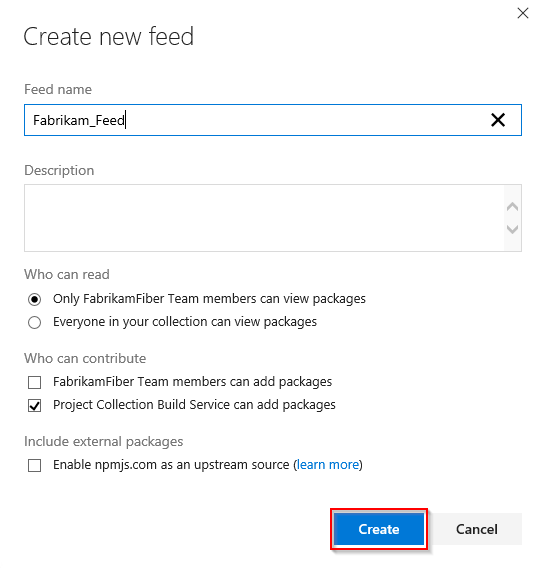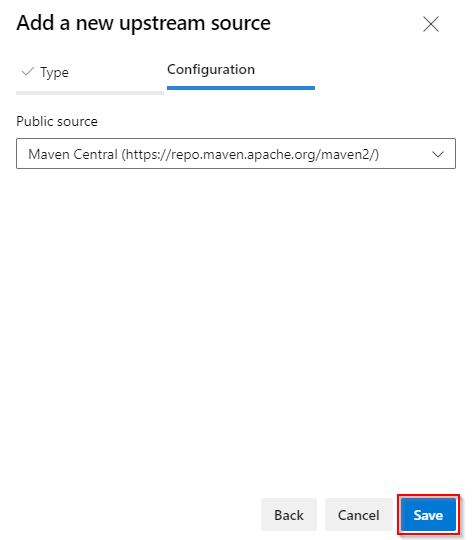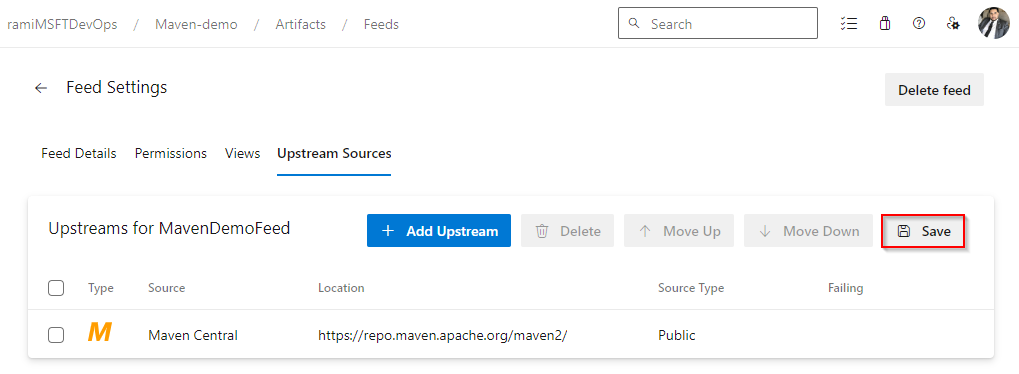Use packages from Maven Central
TFS 2018
Using Azure Artifacts upstream sources allows you to use a single feed for hosting both the packages you produce and those from public registries such as Maven Central. By enabling upstream sources in your feed, Azure Artifacts will automatically save a copy of any package installed from upstream. This ensures continued accessibility for your development, even in the event of a public registry outage. Additionally, Azure Artifacts supports various other Maven upstream sources, including the Google Maven Repository, Gradle Plugins, and JitPack.
Prerequisites
An Azure DevOps organization and a project. Create an organization or a project if you haven't already.
An Azure Artifacts feed.
Note
Maven snapshots are not supported with Maven upstream sources.
Enable upstream sources
If you don't have a feed already, follow the instructions below to create one, and make sure that you check the upstream sources checkbox to enable them. If you already have a feed, move to the next step to add Maven Central as an upstream source.
Azure Artifacts comes pre-installed in TFS 2018. If this is your first time using your feed, you might be prompted to assign a license.
Navigate to your project
http://ServerName:8080/tfs/DefaultCollection/<ProjectName>.Select Build & Release, and then select Packages.
Select + New feed to create a new feed.
Provide a meaningful Name and Description for your feed. Specify the permissions for who can read and who can contribute, and decide whether to Include external packages.
Select Create when you're done.

Add Maven Central upstream
If you checked the upstream sources checkbox when creating your feed, Maven Central should already be added as an upstream source. If not, you can add it manually using the following steps:
Sign in to your Azure DevOps organization, and then navigate to your project.
Select Artifacts, and then select the
 in the top right corner to navigate to your Feed Settings.
in the top right corner to navigate to your Feed Settings.Select Upstream sources, and then select Add Upstream.
Select Public source, select Maven Central (https://repo.maven.apache.org/maven2/) from the dropdown menu, and then select Save when you're done.

Select Save in the top right corner to save your changes.

Save package from Maven Central
Before saving packages from Maven Central, make sure you have set up your project to connect to your feed. If you haven't done so already, follow the instruction in the project setup to set up your Maven project and connect to your feed.
In this example, we will save the Kotlin Datetime Library from Maven Central.
Navigate to Maven Central at
https://mvnrepository.com/.Search for the Kotlin Datetime Library. Select the Kotlinx Datetime package, and then select the version you wish to install.
Copy the
<dependency>snippet from the Maven tab.<dependency> <groupId>org.jetbrains.kotlinx</groupId> <artifactId>kotlinx-datetime-jvm</artifactId> <version>0.4.1</version> <scope>runtime</scope> </dependency>Open your pom.xml file and paste the snippet inside your
<dependencies>tag, and then save your file.Run the following command from the same path as your pom.xml file to install your dependencies:
mvn install
Note
You must be a Collaborator or higher to save packages from upstream sources. See Permissions for more details.
View saved packages
You can view the packages you saved from upstreams by selecting the Maven Central source from the dropdown menu.
Sign in to your Azure DevOps organization, and then navigate to your project.
Select Artifacts, and then select your feed from the dropdown menu.
Select Maven Central from the source dropdown menu to filter for packages from this upstream.
The Kotlinx Datetime package that we saved in the previous step, is now available in our feed. Azure Artifacts automatically saved a copy to our feed when we executed the mvn install command.

Tip
If Maven is not downloading all your dependencies, run the following command from the project directory to regenerate your project's files:
mvn eclipse:eclipse -DdownloadSources=true -DdownloadJavadocs=true